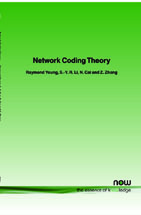Network Coding Theory Part II: Multiple Source
By Raymond W. Yeung, Department of Information Engineering, The Chinese University of Hong Kong, Hong Kong, whyeung@ie.cuhk.edu.hk | Shuo-Yen Robert Li, Department of Information Engineering, The Chinese University of Hong Kong, Hong Kong, bob@ie.cuhk.edu.hk | Ning Cai, The State Key Lab. of ISN, Xidian University, China, caining@mail.xidian.edu.cn | Zhen Zhang, Department of Electrical Engineering-Systems, University of Southern California, USA, zzhang@milly.usc.edu
Abstract
Store-and-forward had been the predominant technique for transmitting information through a network until its optimality was refuted by network coding theory. Network coding offers a new paradigm for network communications and has generated abundant research interest in information and coding theory, networking, switching, wireless communications, cryptography, computer science, operations research, and matrix theory.
In this issue we review network coding theory for the scenario when there are multiple source nodes each intending to transmit to a different set of destination nodes.
A companion issue reviews the foundational work that has led to the development of network coding theory and discusses the theory for the transmission from a single source node to other nodes in the network.
Network Coding Theory
Network Coding Theory provides a tutorial on the basic of network coding theory. It presents the material in a transparent manner without unnecessarily presenting all the results in their full generality. Store-and-forward had been the predominant technique for transmitting information through a network until its optimality was refuted by network coding theory. Network coding offers a new paradigm for network communications and has generated abundant research interest in information and coding theory, networking, switching, wireless communications, cryptography, computer science, operations research, and matrix theory. The tutorial is divided into two parts.
Part I is devoted to network coding for the transmission from a single source node to other nodes in the network. Part II deals with the problem under the more general circumstances when there are multiple source nodes each intending to transmit to a different set of destination nodes.
Network Coding Theory presents a unified framework for understanding the basic notions and fundamental results in network coding. It will be of interest to students, researchers and practitioners working in networking research.

Companion
Network Coding Theory Part I: Single Source , Foundations and Trends® in Communications and Information Theory, Volume 2, Issue 4 10.1561/0100000007I